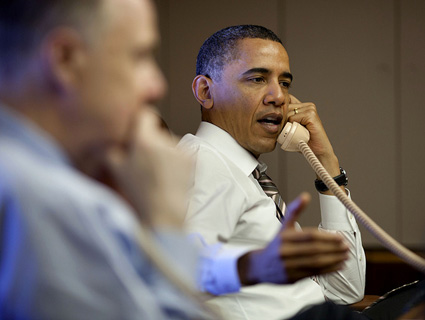So how are things going in Libya? One thing is becoming even more obvious than before: the rebel “army” is small, poorly trained, poorly armed, and unlikely to win on its own. According to C.J. Chivers of the New York Times:
Prone to panic, they often answer to little more than their mood, which changes in a flash. When their morale spikes upward, their attacks tend to be painfully and bloodily frontal — little more than racing columns down the highway, through a gantlet of the Qaddafi forces’ rocket and mortar fire, face forward into the loyalists’ machine guns.
So what does this mean? Muammar Qaddafi’s capabilities are pretty limited too, which means we might well be looking at an indefinite de facto partition of the country, with Qaddafi controlling Tripoli and the west and rebels controlling Benghazi and the east. Tara Bahrampour of the Washington Post confirms this:
For the United States and other Western powers, the rebel efforts to build the rudiments of a nation in eastern Libya reflect the reality of a military stalemate — one in which NATO could be ensnared for months or
more. “We don’t like it, we don’t want it, but this scenario might happen,” said Fathi Baja, the rebels’ head of international affairs.
So how does this play out? There’s still a chance that Qaddafi will crumble. Libya’s loss of oil revenue will continue to squeeze him. The mercenaries fighting for him might decide to leave for better opportunities elsewhere. His supporters might continue to defect as Western sanctions keep biting. But what if he holds on anyway and the rebels are just flatly unable to dislodge him? Fred Kaplan says the events in the broader Middle East are yet another demonstration of the post-Cold War limits of American power:
We find ourselves in the unusual situation—unprecedented in the lifetime of nearly every American breathing today—of watching from the sidelines as world-historical transformations unfold….The fate of all these uprisings is certainly a matter of U.S. interests—arguably, in the case of Egypt and Yemen, our vital interests. Yet there’s little we can do to direct their paths.
The one exception, he says, is Libya. But that may be the exception that proves the rule. How likely is it, after all, that either the United States or its allies will be willing to accept a long, dull stalemate like this? In a sense, it would be even worse than the kind of grinding, inconclusive war we’re fighting in Afghanistan, where we can at least concoct stories about progress and eventual victory. But if Libya settles down into a partition with essentially no fighting at all, no such stories will be possible. We either accept the partition or we don’t.
How likely is it that we will? There’s not a lot of precedent to go on here, but it doesn’t seem like the kind of thing the American (or French or British) public would accept for long. Sure, nobody would be dying, so there probably wouldn’t be huge public protests, but we’d still be committing ourselves to an expensive, indefinite military operation with no goal except to protect the partition of a country nobody really cares much about in the first place.
So what are the alternatives? There are two: either a negotiated settlement of some kind or a decision that the war has to end and Qaddafi has to go. That would mean a Kosovo-style air campaign against Tripoli, kept up until Qaddafi finally either surrendered or was killed.
This is what makes some kind of negotiated settlement so important. Without it, the most likely end point isn’t partition and stalemate, it’s a broadening of the war. How many stalemates can a single president have on his plate at once, after all?
Front page image: Maurizio Gambarini/DPA/Zuma















